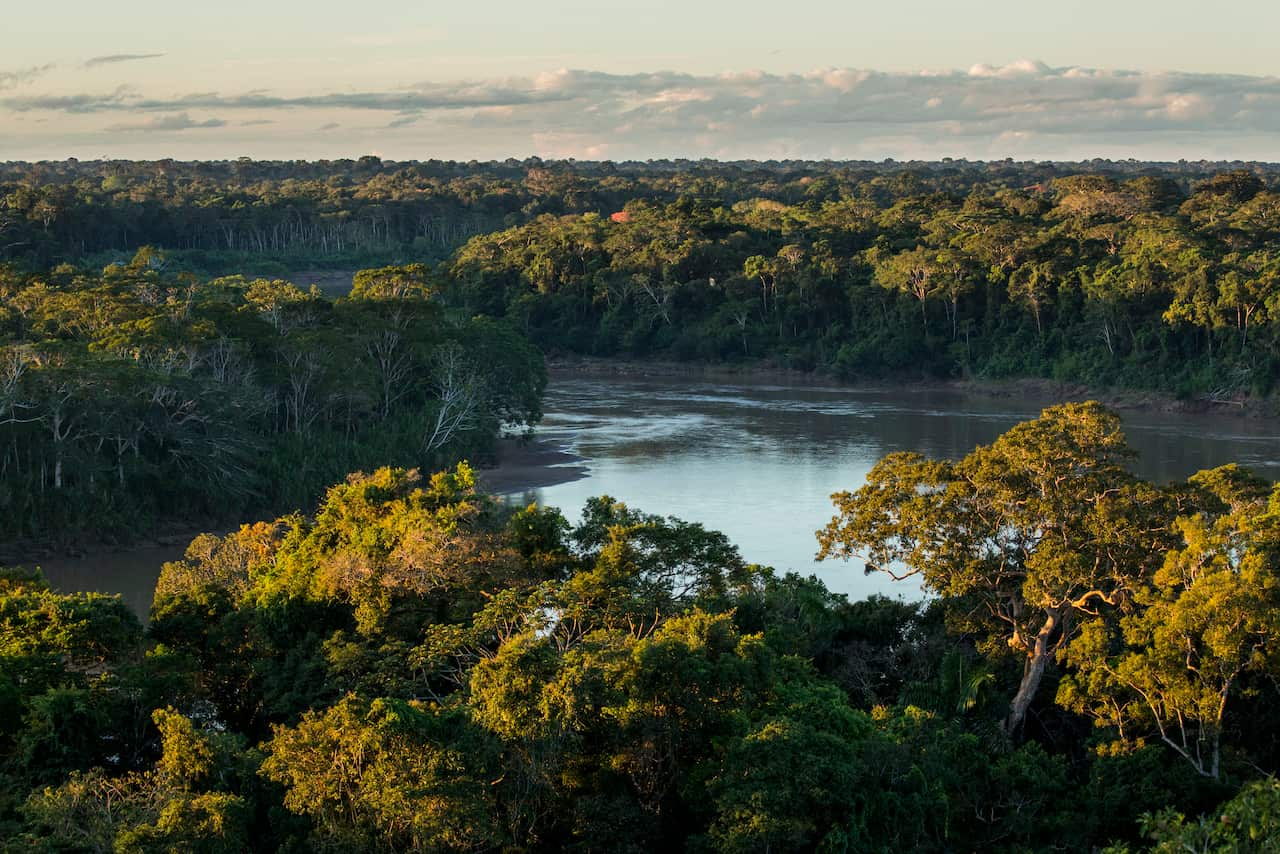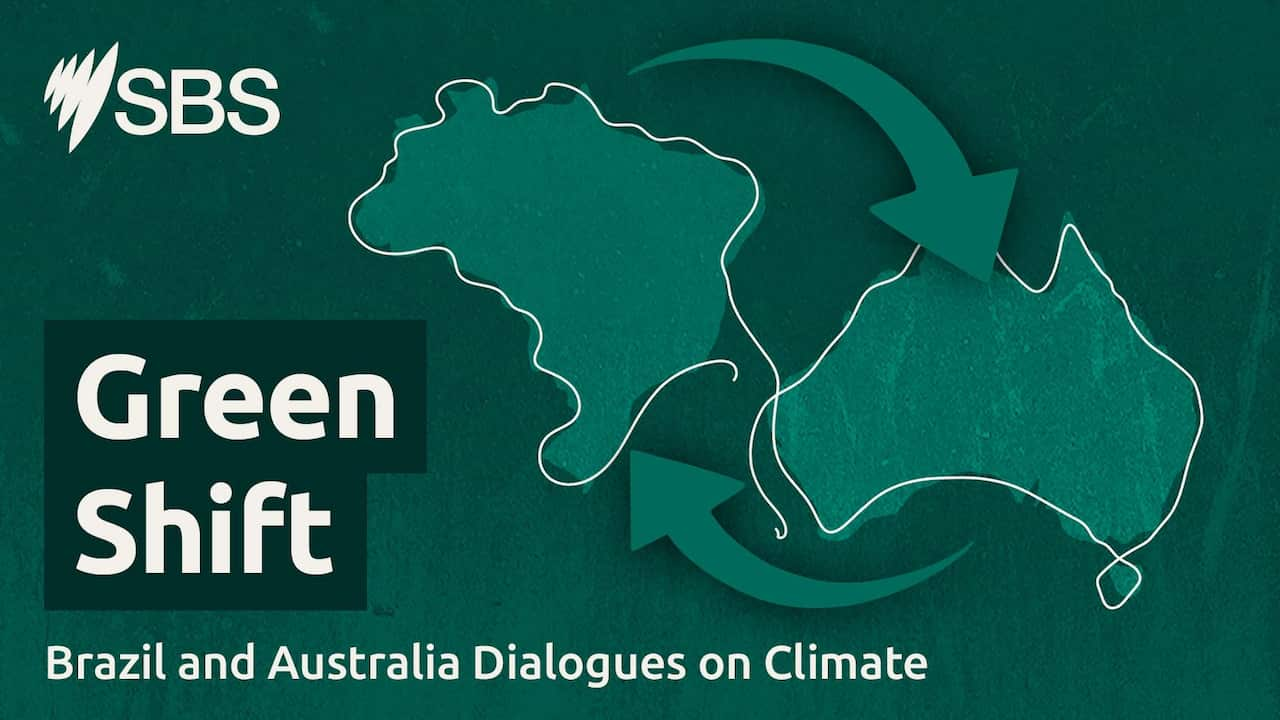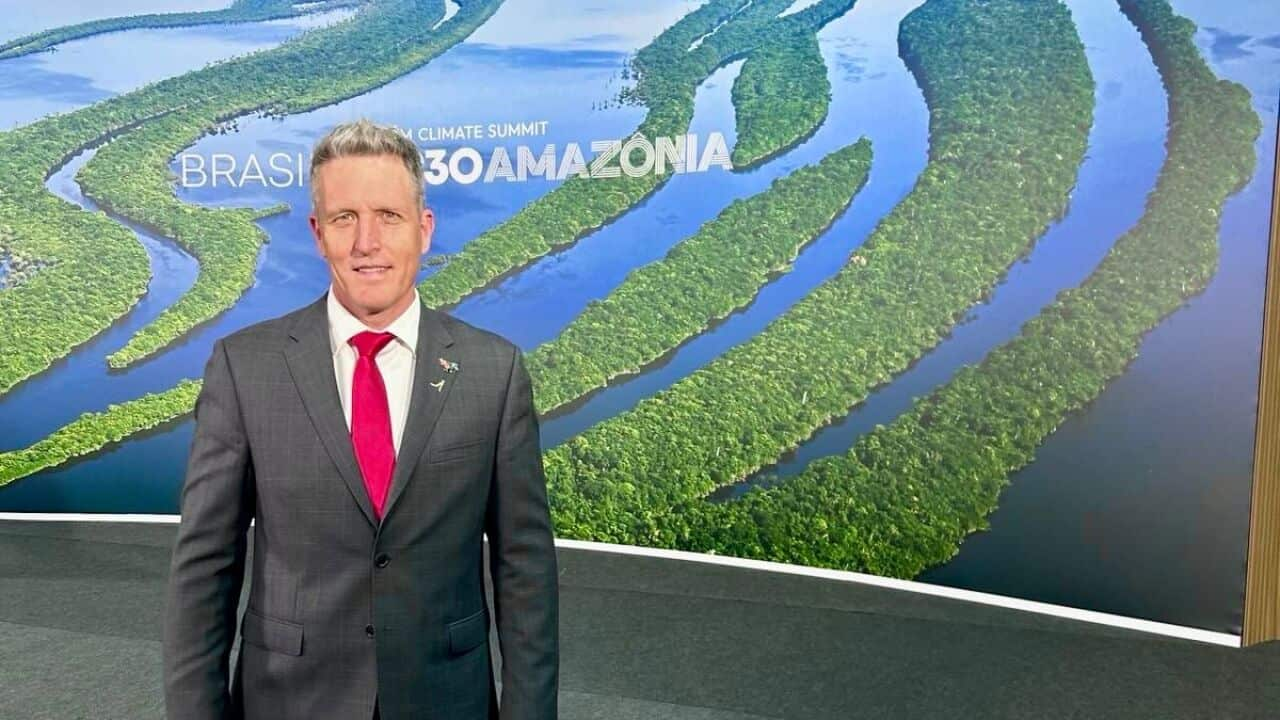From the Amazon to the Pacific
Learning from Brazil

First Nations Knowledge at the Centre
A Warning Against Climate Backsliding
From Belém to the World

EPISODE 3

Assistant Minister for Climate Change and Energy, Josh Wilson is in Brazil for COP 30.


Luciana: Lets cross to Belém, in Northern Brazil, a city on the edge of the Amazon. Joining us now is Australia's Assistant Minister for Climate Change and Energy, Josh Wilson. Good afternoon, Minister.
Josh Wilson: Good afternoon and very good to be with you.
Luciana: Before we dive into COP, is this your first time in Brazil and did you get to visit the Amazon?
Josh Wilson: It is my first time in Brazil. Of course I'm very focused on the work that's happening at COP, but I have had the opportunity to see a little bit of the city and the Amazon river delta and it's an incredibly impressive part of the world. And being on the edge of the green
lung of the Amazon reinforces the importance of the work that is going on here, at Belém and the leadership of Brazil around the importance of global cooperative action to combat dangerous climate change and to deliver the energy transition in a way that's effective, and fair.
Luciana: I imagine it's a powerful image to see the Amazon, to feel the weather and it should be an experience.
And what's the atmosphere like at COP so far? We are now on day two. I believe you finished day two of COP 30. What are your key takeaways so far?
Josh Wilson: Well, I was here last week for the Leaders Summit part and then of course we're on day two of the COP programme and there is certainly a sense of resolution, there's a sense of energy and I think some optimism but also realism because the the multilateral system has taken a few knocks in recent
times and we need processes like this to be at their best in all of our interests, to see concerted global action on what is really the biggest challenge we face in the 21st century and more than likely in the 22nd century. But President Lula spoke very impressively and forcefully in the Leaders
Summit part of the programme and some of the plenary contributions, including from leaders in the Pacific, have reinforced the urgent need for us to keep going forward, decarbonising, reducing emissions, controlling temperature to make sure that we have a safe climate and a safe planet, and of
course to do that by the energy transition by investing in renewables and clean industry technology, but making sure that as we do that we bring everybody along because some of the communities that are most affected by climate change are the ones that have contributed least to it and they're also
communities that face significant development challenges. And that's true about the Pacific and that's why obviously as we participate wholeheartedly in COP30, we are also making an argument for seeing COP31 Ah, come to the Pacific to, to be shared in partnership between Australia and Pacific
nations.
Luciana: You've been in meetings with other leaders, the Brazilian President, Lula, Keir Starmer and Emmanuel Macron. How can we act despite the withdrawal, the completely withdrawal of United States from these conversations?
Josh Wilson: Well, we need to remember that, these kinds of efforts don't rest on any single nation. Obviously they, they work best if everyone is part of it. And it would make a big difference if the United States have continued, as it has done in the past, both to contribute to the work and to be a beneficiary
of it. But we know that there are ups and downs in every journey. There are bumps along the road and we have to take those in our stride. And there is a lot of enthusiasm, energy, commitment, problem solving, focus across the global community and the Global north and the global south, as we say. And
there are lots of leaders that are making that point in no uncertain, terms, as well as other kinds of representatives, ministerial representatives like myself and ambassadors and others. And because that's the nature of the COP, that it's not just about government representatives, civil society,
you know, environmental and energy groups and groups representing, first nations interests and people wanting to see continued work on gender equality. You know, all of those voices are ah, here. And I've had some fantastic roundtable meetings with first nations, representatives, with young,
Australians, with civil society to hear from them about their priorities, their work here and what they would like to see if we're successful in bringing COP31 to the blue Pacific continent.
Luciana: Australia is competing with Türkiye. How is that competition going? Have you spoken to the Turkish delegation? And when will we know who gets to host COP31?
Josh Wilson: Well, we hopefully will know by the end of this process. We would love that issue to be resolved, as soon as possible. But you know, these things, can take time and ultimately it's a sort of a consensus decision rather than having a, you know, a particular mechanism or a vote. The Australian
Pavilion and the Turkish Pavilion are side by side and you know, we are, we are a good friend to Türkiye and we understand why they've wanted to be part of this process. What we have done with the Pacific, we believe convincing, compelling argument for why the world needs to come and understand the
climate challenges in our part of the world. Go from the green lungs of the Amazon to the blue lungs of the Pacific. And we've Got very strong support from across the global community for that proposition. But it's ultimately a good faith and goodwill process. That's how we've conducted ourselves,
respecting Türkiye interest of course, but hoping that we can come to a resolution, that we'll see the continued momentum and stability of this process because that's what the world needs from COP to cop.
Luciana: When you say we will know at the end of this process, which process? At the end of COP?
Josh Wilson: Yes, at the end of cop.
Luciana: Two weeks time and there is no voting. The selection process is just a consensus.
Josh Wilson: Well there's, you know, the way that COP has worked is that different regional groups, sort of take turns so that we see the COP being hosted in different parts of the world. It's the time of the group that Australia is part of. And we have very strong support because the case for bringing the world
to the Pacific, it would be the first partnership of this kind between Australia and the Pacific. The case is very strong. The feedback we get is very, very positive. But the way that the decision is made involves consensus through a, goodwill and good spirit, form of engagement. And that's that's
how we will continue to approach it, you know, putting our best foot forward. We think it's the responsible thing to do. We know that our Pacific, family, are very committed to the value of bringing the world to our part of the planet. and we think it's the responsible thing for Australia to do. And
we believe really that it's, it's in our national interest. I mean we have a strong reason to want to see effective climate action, and we have a very, very strong interest in the energy transition that has taken such big steps forward over the last three and a half years of the Albanese Government.
Luciana: The Amazon is central to Indigenous climate action. If COP31 happens here in the Pacific, in Australia, how important is it for Australia to include Indigenous voices? How inspired are you by COP30 in the Amazon?
Josh Wilson: Well, it is inspirational. You know, the Amazon is one of the great natural features of the Earth. It makes such a beneficial contribution to biodiversity, to the creation of oxygen and the health of our planet. It is a wonder of the world and it's a privilege to be here and be able to experience it
directly. Because as much as you, you know, you read about things or you see a fantastic documentary about a wonder like the Amazon being proximate to it is, is something different again. So we do take that inspiration and you're right to say that part of Brazil's leadership and focus has drawn
strength on from its indigenous traditions and we believe that that that first nations aspect of our life in Australia but also the life of the Pacific family is one of the really strong arguments for bringing the world to our part of the planet. And I had a great roundtable with first nations
representatives who emphasised that to me, said that they are supportive of seeing the COP in Adelaide next year and talking about the kinds of things that they want to showcase because we do have some examples. You know, I'm as the Assistant Minister responsible for the Savanna Fire Burning ACCU
method which is, has seen the practice of cool temperature pattern burns by First Nations organisations in Northern Australia that have been remarkably effective in reducing emission abatements through large hot fires. and they've also been effective in sequestering carbon and delivering
biodiversity outcomes as well. So we think that there are some aspects of our first nations culture and its many thousands of years of demonstrated sustainability practise that would be a feature of a COP, in partnership between Australia and the Pacific.
Luciana: We have your delegation there and I believe Minister Chris Bowen is also going to the Amazon next week. Why didn't Prime Minister Anthony Albanese is attending the event? Why he's not there?
Josh Wilson: Well sure, as you can imagine your listeners would imagine the Prime Minister has a busy schedule at the best of times and he's done some very important work on Australia's behalf in a number of different international forums in recent times. There are some leaders who are able to attend COPs. But
in many cases the involvement of the delegations is led by a Minister, in some cases even by an ambassador or another kind of representative. The way that Australia approaches COP 30 this COP is similar to how we participated very effectively last year at COP 29 in Azerbaijan. I'm m here in the
first week and then Minister Bowen, the Minister for Climate Change and Energy will come in the second week which is when a lot of the COP 30 agenda negotiations really get worked out. And Minister Bowen played an important role in helping to ensure that the last COP actually delivered on a, on a
new global finance commitment or mechanism. and I know that he will be looking forward to getting over here in a few days time and picking up that work again just as I've been privileged to support our delegation here and engage with other delegations and ministerial representatives. Over the last
four or five days. That's entirely the way that we've approached this in the past. And of course the sort of contact between Australia and Turkey over recent months continues to occur between leaders and senior ministers like Minister Bowen and our foreign Minister, as we seek in a goodwill and good
faith fashion to resolve the issue of who has the responsibility, the stewardship of hosting COP 31.
Luciana: You are in Brazil. Australia and Brazil are two giants of the global South. What can we learn from each other? We are working together on clean energy and biodiversity both. Over 80% of Brazil's power comes from renewables, largely led by its extensive hydropower industry. What can we learn from each other? are there any agreements, projects of
working together? Maybe a back to back co op? How do you see this partnership?
Josh Wilson: Well it's exactly as you say. I mean we're both very large territorial nations in the Southern hemisphere. We both have significant strength that comes to us through our First Nations heritage which we need to value and protect and draw upon. Brazil has shown great leadership as you say, a
significant renewable energy producer and it has been a great advocate for concerted action. President Lula has done a really good job in making this, the implementation copper. Some are calling it the truth COP, you know, saying it's time for the global community to really focus on the
commitments we've made and keep seeing those implemented. so you know we would carry some of those things forward. We are also a country that's blessed with renewable energy resources and we've achieved some remarkable things and we've doubled renewable energy generation in Australia in the last six
years and we'll do that again before 2030. Certainly. Our NDC, our commitment to reduce emissions from between 62 and 70% by 2035 and our target of 82% renewables generate a lot of respect. when you get together in global gatherings like this one, we would love to pick up the importance work that is
occurring here under the leadership of President Lula and Brazil and carry that forward in a stable sort of forward trajectory way which is what the world needs and some of the things that they have champion around forests and the protection of forest, the need to look at and integrate our sort of
fire landscape management focus on the significance of zero emission liquid fuels. You know these are things, imperatives that we share with Brazil and that the Pacific shares with Brazil and hopefully if things go well in the next couple of weeks we will get to carry forward the legacy of COP 30
into another Southern Hemisphere COP 31 in Adelaide.
Luciana: As you mentioned about the NDCs, the Paris Agreement set ambitious goals, but emissions keep rising. What can we do to change ambition into action? We woke up this morning here in Australia. The Liberal Party is meeting, discussing scrapping net zero targets. What is your response to that?
Josh Wilson: Well, look, nothing would be more harmful than the approach that the Liberal Party is currently considering. Nothing would be more harmful in terms of our international reputation, our future as a destination for investment, for jobs, for the broader economic, social, environmental wellbeing of
Australia. I mean everybody the world over knows how real and serious climate change is and how much we need to make a contribution to creating the safest climate that we can through emission reductions. And in Australia, frankly, you know, people have voted with their feet. We're the highest
penetration distributed rooftop, solar, jurisdiction in the world. One in three Australian households have home solar. In my state of Western Australia it's two in five. And now our cheaper home battery, programme is seeing people take on home storage as well. We know that people want more options
when it comes to zero emission vehicles which they didn't have under the previous government. it's important that every country does what it can to tackle what is a global problem of enormous magnitude. Australia certainly has, lodged a very ambitious NDC. It's right up there with the target that
the European Union, has adopted and it's very, very welcome in the global community. Of course we're encouraging through this process, we're encouraging countries to, to lodge their NDCs, if they haven't, their commitments, to reduce emissions by 2035. And we are always an active part of the
conversation in saying that the targets are the first step and then implementing the targets are the second step. And that's something that Australia, can proudly say that every time we've set a target we've also had the accompanying plan, as we do in this case, the net zero plan across six sectors
of our economy that chart the way forward so that we actually deliver on that. And it is not just important because of, the risks that climate change represents to almost every area of our life. but it is also the way that we can benefit from our incredible comparative advantages in this inevitable
global transformation to clean energy and clean industries. So, yeah, I think that's well understood actually in the Australian community. And I frankly don't understand why the Liberal Party or the coalition more broadly seems to find itself in this, never ending obsession and death spiral around
climate denialism, because it is the denial of the reality, both in terms of, the climate and our economic future.
Luciana: Thank you, Minister, Assistant Minister for Climate Change and Energy, Josh Wilson, speaking to us from Amazon. Thank you so much for your time today and good luck.
Josh Wilson: Thank you. Thank you. And thanks for the conversation. Really appreciate it.